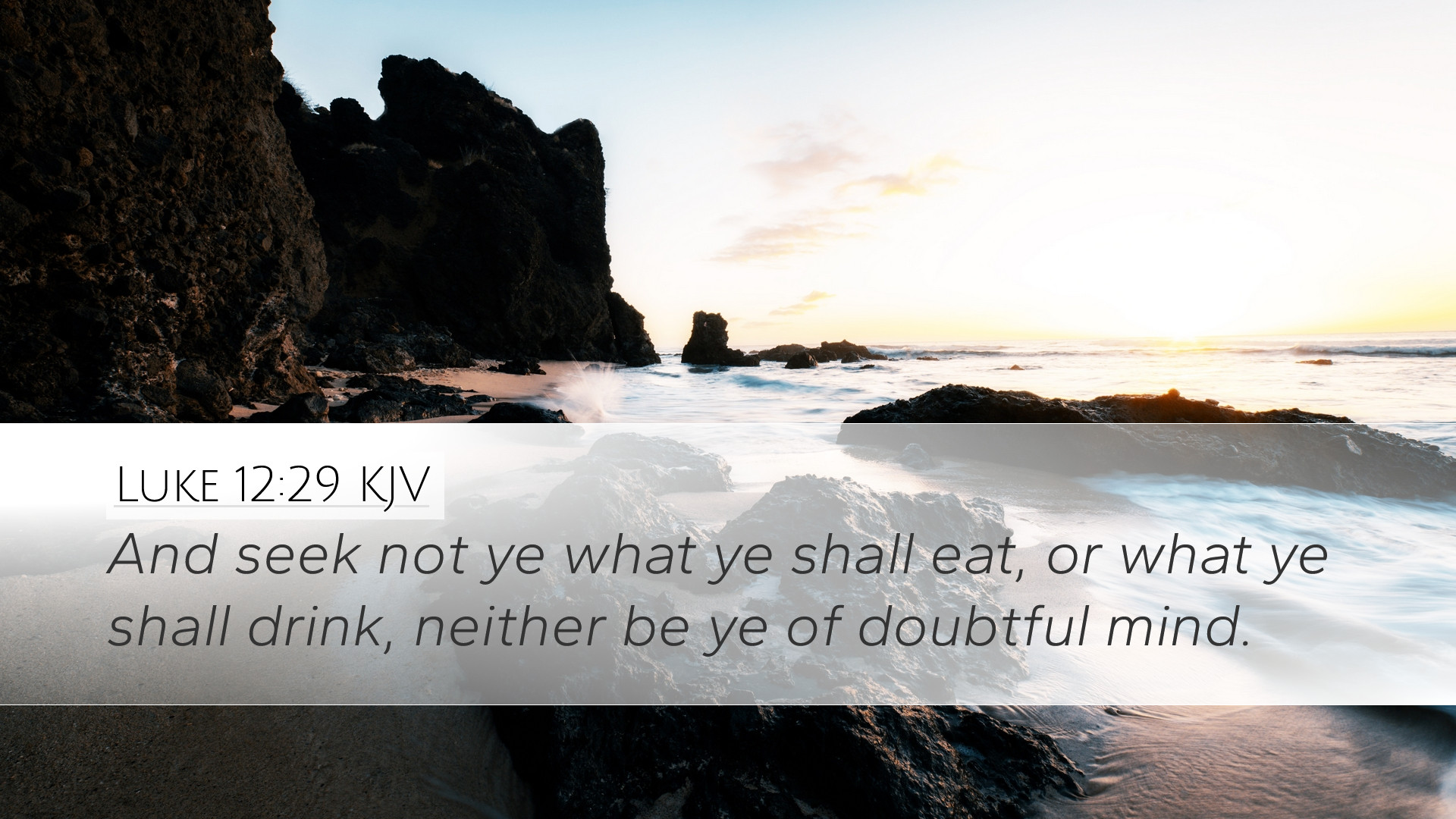Commentary on Luke 12:29
Introduction
In Luke 12:29, Jesus instructs His followers not to be anxious about their needs, specifically addressing the concerns related to material necessities and the anxiety that often accompanies the quest for these things. This verse speaks profoundly to the heart of Christian faith, encouraging believers to trust in God's provision.
Contextual Background
This verse exists within a broader discourse where Jesus emphasizes the folly of materialism and the importance of seeking the Kingdom of God. Matthew Henry illustrates that the surrounding verses highlight a contrast between divine wisdom and worldly worry.
"And seek not ye what ye shall eat, or what ye shall drink..." (Luke 12:29) denotes a call to a radical trust in God. This call is not merely passive but rather an active pursuit of spiritual priorities over earthly concerns.
Commentary from Matthew Henry
Matthew Henry explains this verse as an admonition against anxiety stemming from earthly desires, contrasting it with the peace found in faith. He states, "The heart is put to trouble and disquietude when it is set upon the world." He emphasizes that pursuing such cravings diverts the heart from seeking God’s Kingdom.
Henry further directs attention to the futility of excessive concern, explaining that such worries are often "the result of an irreligious spirit." Instead, he encourages believers to "commit their way unto the Lord," reinforcing that reliance on God brings tranquility.
Insights from Albert Barnes
Albert Barnes expands upon the idea of seeking after material needs, noting that such anxieties often reveal a lack of faith. He states, "The true believer should not be anxious; he should leave his wants in the hands of a wise and benevolent God." This statement encapsulates the essence of spiritual reliance and portrays the character of God as trustworthy and generous.
Barnes also emphasizes the cultural context of Jesus’ audience, recognizing that the ancient Near East was often plagued by economic instability. Thus, Jesus’ exhortation to avoid worry was particularly poignant. By placing trust in divine providence, believers align themselves with God's sovereignty over their lives.
Analysis by Adam Clarke
Adam Clarke provides a deep theological reflection on the nature of human anxiety in relation to God’s provision. He declares that anxiety is not only unproductive but it stands in contrast to the character and promises of God. Clarke notes, "The Lord knows how to provide for His people," comprehensively illustrating the truth of divine providence in every circumstance.
Clarke also highlights Jesus’ use of “seek not ye” as both a directive and a comforting assurance. The implication is that while worldly needs may demand attention, God’s Kingdom must take precedence, guiding believers away from becoming ensnared in the worries of life.
Spiritual Application for Today
- Trust in God’s Provision: Each commentary underscores that trust in God's faithful provision is paramount. Believers are reminded that their Heavenly Father cares for their needs.
- The Priority of the Kingdom: A consistent theme is the necessity of prioritizing spiritual pursuits over earthly ones. It urges Christians to evaluate their priorities and commitments in light of God’s eternal Kingdom.
- Combating Anxiety: In a world rife with material concerns, this verse serves as a counter-narrative to anxiety. It teaches that while one cannot neglect responsibilities, they can possess peace by casting their cares on God.
Conclusion
Luke 12:29 is a powerful reminder of the importance of faith in God’s provision. Commentators like Matthew Henry, Albert Barnes, and Adam Clarke each bring unique insights that bolster the understanding of this verse. The collective message encourages believers to shift their focus from worldly anxieties to divine trust, an essential aspect of Christian living. In embracing this teaching, believers find a profound peace that transcends the trials of life, knowing full well that their needs are met by a loving God.


